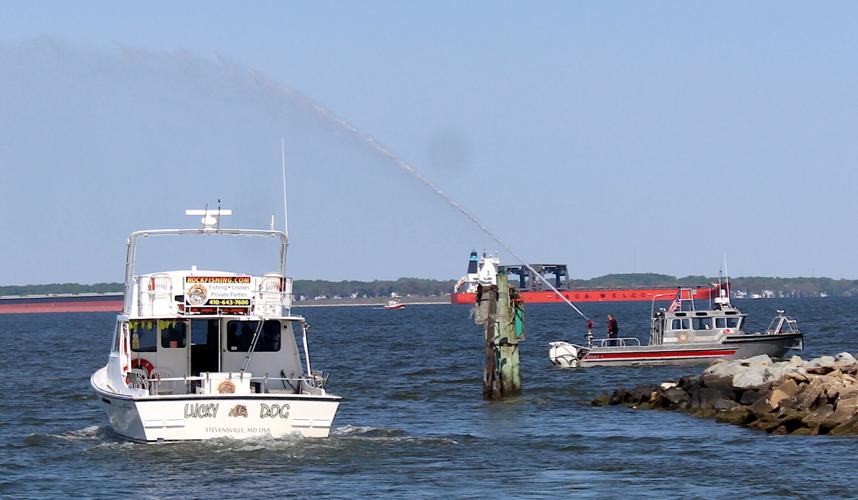WASHINGTON — The Supreme Court has denied a hearing for a coalition of Maryland fishing associations and charter boat operators seeking to overturn new striped bass fishing restrictions. But for Captain Robert Newberry, chairman of the Delmarva Fisheries Association, the legal battle is far from over.
“It’s not good that we were denied the hearing in front of the Supreme Court, but this is far from over. We are in it to win it! We will be announcing our next move within a week,” Newberry said, emphasizing that no other group in the state has fought as hard on this issue as the Delmarva Fisheries Association, the Maryland Charter Boat Association, and supporters like Brian Nesspor and Ken Jefferies.
The coalition had filed an emergency petition with the Supreme Court to block the Atlantic States Marine Fisheries Commission’s (the Commission) new restrictions, arguing they imposed “drastic, unwarranted, and illegal limitations” on striped bass fishing in the Chesapeake Bay and along the Atlantic coast. The March 4 petition claimed the regulations violated the U.S. Constitution and threatened the livelihoods of small fishing businesses.
Newberry learned of the decision from the Supreme Court just a week after filing. An explanation of the denial is expected to be forthcoming, he said.
The case follows months of legal disputes in lower courts, where the plaintiffs sought to halt the Commission’s 2024 striped bass management plan, known as Addendum II. The plan, approved in January by a 14-2 vote, reduced commercial quotas, shortened fishing seasons, and limited recreational anglers to catching just one striped bass per day instead of two.
Maryland and New Jersey voted against the measure, but Maryland ultimately implemented the restrictions under pressure from the Commission and federal agencies. The Maryland Attorney General’s Office acknowledged in a letter that failing to comply could trigger a federal moratorium on all striped bass fishing in state waters.
Assistant Director and Fisheries Manager at the Maryland Department of Natural Resources, Michael Luisi, warned the Commission that reducing Maryland’s charter boat clients’ catch to one fish per day would “put people out of business.”
Documents filed by the plaintiffs argue that the Commission disregarded these warnings, relying on uncertain projections about fish-spawning trends while neglecting the immediate economic harm to family-run businesses. Newberry expressed frustration with Maryland officials, particularly Governor Wes Moore and Attorney General Anthony Brown, for not standing with the seafood industry.
“It is extremely perturbing that Governor Moore and Attorney General Brown turned their backs on us,” Newberry said. “They are willing to spend millions of taxpayer dollars defending Maryland against alleged constitutional violations by President Trump, but they ignore the constitutional violations affecting the seafood industry.”
Industry leaders say the damage is already evident.
“The economic impact is undeniable,” said Brian Hardman, president of the Maryland Charter Boat Association. “We’ve seen a 75-85% decline in business, boats being sold off, and captains leaving the industry. The Commission rushed through regulations without considering the devastating impact on local livelihoods.”
Hardman added that “2025 numbers are continuing to decline at the same rate or worse,” citing the unprecedented sale or listing of 53 charter boats since 2024. He also noted that 43 charter boat businesses have shut down, with 11 more on the brink of collapse.
The legal challenge centers on alleged constitutional violations, including the 10th Amendment’s prohibition on federal overreach, the 5th Amendment’s protection against government takings without just compensation, and the 14th Amendment’s due process clause. The plaintiffs also contend that the Commission, originally established as an advisory body, has unlawfully assumed regulatory powers without proper state and federal oversight.
The Commission defended its decision, emphasizing the need for conservation measures to prevent further declines in striped bass populations.
Critics, however, argue that the Commission’s data is inconsistent. Its own projections have fluctuated, estimating a 97% chance of population recovery in 2023, only to drop to 15% in 2024 before rebounding to 50% in 2025. Plaintiffs claim the estimated 240 million striped bass in U.S. waters far outweigh the annual fishing removals of approximately six million.
The Supreme Court previously declined to hear an emergency appeal in May, citing a lack of prior appellate review. The plaintiffs returned to the high court after exhausting their options in the U.S. Court of Appeals for the Fourth Circuit, which dismissed the case in February on the grounds that the plaintiffs sued the Commission rather than the state of Maryland.
With the 2025 fishing season set to begin in May, the petitioners had hoped the Supreme Court would issue an injunction restoring previous fishing limits while the legal battle continues. Without relief, they warn that more charter businesses will shut down, further damaging Maryland’s historic fishing industry.













(0) comments
Welcome to the discussion.
Log In
Keep it Clean. Please avoid obscene, vulgar, lewd, racist or sexually-oriented language.
PLEASE TURN OFF YOUR CAPS LOCK.
Don't Threaten. Threats of harming another person will not be tolerated.
Be Truthful. Don't knowingly lie about anyone or anything.
Be Nice. No racism, sexism or any sort of -ism that is degrading to another person.
Be Proactive. Use the 'Report' link on each comment to let us know of abusive posts.
Share with Us. We'd love to hear eyewitness accounts, the history behind an article.